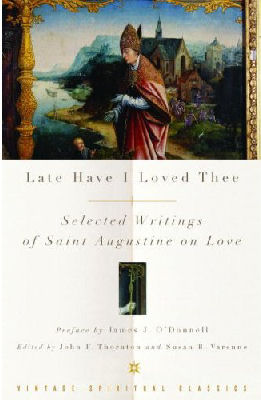
|
Posted February 19, 2007
Book: Late Have I loved Thee: Selected Writings of Saint Augustine on Love Edited by: John F. Thornton and Susan B. Varenne Vintage Spiritual Classics. New York. 2006. Pp. 413 An Excerpt from the Jacket:
An Excerpt from the Book: You ask, perchance, What is this happy life? On this question the talents and leisure of many philosophers have been wasted, who, nevertheless, failed in their researches after it just in proportion as they failed to honor him from whom it proceeds and were unthankful to him. In the first place, then, consider whether we should accept the opinion of those philosophers who pronounce that man happy who lives according to his own will. Far be it, surely, from us to believe this, for what if a man’s will inclines him to live in wickedness? Is he not proved to be a miserable man in proportion to the facility with which his depraved will is carried out? Even philosophers who were strangers to the worship of God have rejected this sentiment with deserved abhorrence. One of them, a man of the greatest eloquence, says, “Behold, however, others, not philosophers indeed, but men of ready power in disputation, who affirm that all men are happy who live according to their own will. But this is certainly untrue, for to wish that which is unbecoming is itself a most miserable thing: nor is it so miserable a thing to fail in obtaining what you wish as to wish to obtain what you ought not to desire.: what is your opinion? Are not these words, by whomsoever they are spoken, derived from the Truth itself? We may therefore here say what the apostle said of a certain Cretan poet whose sentiment had pleased him: “This witness is true.” He, therefore, is truly happy who has all that he wishes to have, and wishes to have nothing which he ought not to wish. Table of Contents: From The Confessions Book I Book II Book III Book IV Book V Book VI Book X Book XI Book XIII From The City of God Chapter 6-7-9 Chapter 13 Chapter 22 Chapter 28 Book XV Chapter 22 – 23 – 24 Chapter 30 Book XIX Chapter 4 Chapter 20 Book XXI Chapter 15 Chapter 21 - 22 - 23 From ON Christian Doctrine Chapter 3 - 4 - 22- 23 - 24 - 25 - 26 - 27 - 28 - 29 - 36 - 37 - 38 - 39 - 40 From The Enchiridion on Faith, Hope, and Love Chapter 31 - 32 - 33 From Augustine’s Letters Letter 20 - 27 - 58 - 130 - 189 From Expositions on the Psalms Psalm 16 - 18 - 23 - 26- 27 - 30 - 31 - 36 - 51 - 54 - 67 - 73 - 90 - 96 - 121 - 149 From The Trinity Chapter 1 - 2 - 3 -4 - 5 - 6 - 7- 8 - 9 - 10 From Tractates on the Gospel of John 1st Gospel - 2nd - 5th - 6th - 9th - 10th Selected Sermons Sermon 33 - 34 - 344 - 349 - 350 - 350a - 368 - 382 - 385 - 386 |
|
